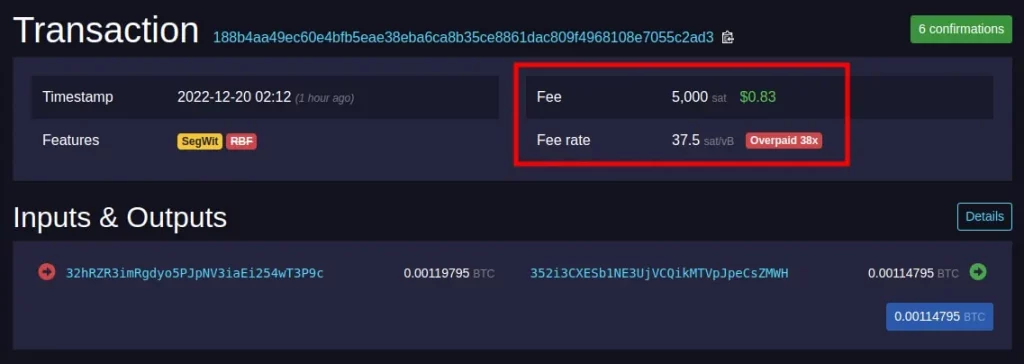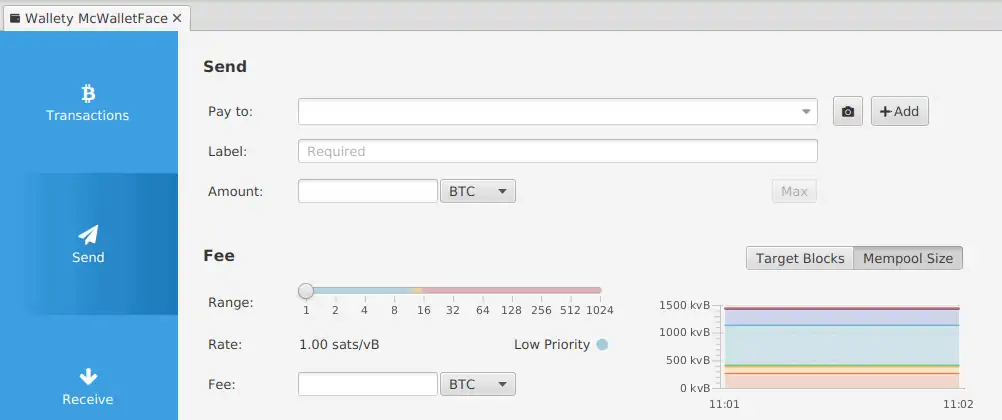As trusted authorities in the world of Bitcoin, we totally get that paying fees suck. We’ve sure paid (and overpaid) our fair share!
It’s also confusing for beginners wondering where do Bitcoin transaction fess go as there’s different fees for different things. That’s why we’re here to provide a detailed breakdown of the different types of fees you may encounter, including mining fees, exchange fees, platform fees, and even what scam fees to watch out for.
Then we’ll get into how you can stop being a sucker that throws their precious bitcoins down the toilet.
Contents
When You Send Bitcoin, Where Do Bitcoin Transaction Fees Go?
There’s a number of different types of transactions you can do with Bitcoin such as sending bitcoins from one person to another or trading USD for bitcoins on an exchange. As such, where the fee goes depends on which fee you’re paying.
This often confuses newbies to the point where they sometimes end up getting scammed out of hundreds of dollars! This is why it pays to continuously learn about Bitcoin if you plan on buying and investing in it. The main types of fees you’ll come across are:
- Mining Fees: Each Bitcoin transaction usually requires a fee (paid in bitcoins) to process it. This is the mining fee and is paid directly to the Bitcoin Miner that includes your transaction in the block they mine
- Exchange/Trading Fees: The fee charged by exchange platforms when you exchange one thing for another, for example USD for BTC. Different Exchanges charge different fees ranging from free to fractions of a percent
- Platform Fees: The fees centralized platforms charge for doing various things on their platform. For example they might charge you for withdrawing your bitcoins out of their exchange wallet
- Scam Fees: It’s not uncommon to hear reports of people being told they need to pay “upgrade” or “activation” fees by scammers or even legit centralized exchanges or platforms. These fees are often huge (think $500, $599 or $900!) and are absolutely scams. Even if the company is legit, you can create a Bitcoin Wallet for free, on any computer or phone in seconds. If they’re charging you these fees leave and never return
For the context of this article, we’ll mostly be discussing the first one, Mining Fees. The others are purely dependent on what (if any) exchange or platform you use.
What Are Bitcoin Transaction Fees?
Bitcoin transaction fees are what’s paid to Bitcoin Miners so they will include your transaction in the next block they mine.
While most banks or other institutions have set fees that you can’t choose or change, with Bitcoin mining fees you get to set the fee for every transaction.
The higher the fee, the better chance the transaction has to be included in the next mined block and the faster your transaction is confirmed. A fee of at least 1 sat/vB (Satoshi per virtual byte) is recommended so the transaction doesn’t get stuck.
Transaction fees are completely unrelated to how many bitcoins you send. You can send billions of dollars for a few cents!
Transaction fees are critical for the security of the Bitcoin network. If there were no (or near free) mining fees then it would be trivial for bad actors to create millions of spam transactions that would clog up the network.
Mining fees also provide a financial incentive to miners. This incentivizes them to commit more and more mining power to the Bitcoin network. The higher this hash rate is, the more secure the network becomes because it means an attacker has to match this higher hash rate in order to take over the network.
The more secure Bitcoin becomes, the more users it attracts which then leads to more transactions and more fees that help to incentivize miners. This self re-enforcing circle is what helps Bitcoin grow. Fees will also enable the miners to remain profitable and engaged once the block reward subsidy runs out in around 2140.

Every transaction on the Blockchain also has the fee information that was paid for it to be mined included in it. It’s quite often you see people (or companies) overpaying by huge margins. In fact for most of 2022 you could easily get your transaction confirmed in minutes with a fee rate of just 1 sat/vB. In 2023 this increased significantly to around 100 sat/vB due to the new crazy of ordinals and inscriptions.
Again, this is why it’s important to learn How Bitcoin Works. If you don’t, you can end up flushing perfectly good sats down the toilet every time you do any transaction for years! You can also learn more in our guide on How To Confirm A Bitcoin Transaction.
How Are Transaction Fees Determined?
Bitcoin transaction fees are only based on how big (in kilobytes) the transaction is as well as how busy the network is. It doesn’t matter if you’re sending $5 or $5 billion dollars in bitcoins.
As each block can only take up to 4 MB of data, you can only fit so many transactions in each one. The bigger in kilobytes your transaction is, the more fees you will be charged. This is why you often see the fee rate specified in “sats/vByte”.

A good Bitcoin Wallet will allow you to pick this fee rate as shown above in Sparrow Wallet. The higher you set the fee rate to, the higher the fee you pay and the more incentive miners will have to include your block over everyone else.
If you’re not in a rush though you can normally set it to whatever the “Low Priority” value is and get it confirmed in a few minutes to a day. It’s also important to know that after your transaction is confirmed in 1 block, your fee rate has no further bearing on how quickly it confirms in subsequent blocks.
New to Athena Alpha? Start today!
How Much Are Bitcoin Transaction Fees?
As you get to pick the fee rate for every transaction it can literally be anything from 1 sat/vB to however many bitcoins you have. In practice though, many people who have no idea what they’re doing simply let their wallet software decide for them which in many cases costs them.

For most of 2022 for example, you could easily get your transaction confirmed in a block in around 10 minutes to an hour with a fee rate of 1-2 sats/vB. In 2023 this was much higher due to the new crazy of ordinals and inscriptions at around 40-4,000 sats/vB.
Now there are many times when paying a much higher fee is the correct thing to do. If you’re paying for an invoice that times out or performing a trade with someone you don’t want it sitting there waiting to be confirmed for days on end. But if you’re not in a rush then there’s no reason to overpay.
How To Save On Bitcoin Transaction Fees
The main things that influence the cost of a Bitcoin transaction is how busy the Bitcoin network (mempool) is and the transaction fee that you set.
- Send When The Network Is Quiet: The best thing you can do to save on fees is just simply wait. Wait until the Bitcoin network is quieter (usually on weekends in USA times) or when the Mempool is emptier. If it’s during the day or maybe something major is happening like a price spike/crash, transactions flood the network and as a result, fees increase.
- Use New Address Types: There are older and newer types of Bitcoin Addresses. If you use the newer Pay-to-Witness-Public-Key-Hash (P2WPKH) address type (also called Native SegWit or just SegWit) then it will take up less kilobytes and thus, cost you less in fees. These address types start with “bc1q…” and can save you over 35% compared to the legacy address types like P2PK or P2PKH. For a deeper look at addresses check out What Is A Bitcoin Address & How To Get The Best One.
- Consolidate Inputs: The more input addresses you use in your transaction the larger in kilobytes it will be, thus costing you more. If your wallet has lots of UTXOs made up of small amounts of bitcoins it can get expensive to send a big amount as it has to use many input addresses. If your wallet supports Coin Control (which it 100% should) then you can wait until the network is quiet and consolidate many small address into a few big ones. This way it reduces the amount of fees you’ll have to pay in the future. The big downside to this is that it can be very bad for your Bitcoin Privacy as it shows to everyone that a single person owns all those input/output addresses.
- Send To Multiple Addresses: You can have multiple outputs in one transaction. For example, rather than paying for 2 transactions to 2 different people, you can pay them both in 1 transaction saving on fees. Not all wallets support this though, so make sure you get yourself a good one like Sparrow Wallet.
- Pay Via The Lightning Network: The Lightning Network is a layer 2 network that operates on top of the Bitcoin base layer 1 network. As such, it can send payments instantly and for basically free. If you’re sending lots of payments or wanting to make very small payments using the Lightning Network will essentially reduce your fees to nothing. While it’s excellent for small to medium payments (say $0.10, $1 or $500) it may not work reliably with larger amounts of $1,000+. This is because it’s still quite new and growing in size and liquidity.
FAQ
Why Are Bitcoin Transaction Fees High?
The most likely reason for high fees is simply that the Bitcoin network is busy. If you want to “jump the queue” and have your transaction confirmed first, you have to pay a high fee.
Other reasons yours specific transaction might have a large fee are:
– Wallet software with poor fee estimation capabilities or static amount
– You’re combining a lot of small inputs to make up a big bitcoin transaction
– You’re using a legacy Bitcoin Address
Are Bitcoin Transaction Fees Voluntary?
No. While transactions have been mined with a 0 sat/vB fee before, they are rare and it’s not recommended as your transaction can get stuck. It’s best to at minimum use a 1 sat/vB fee rate and only when the mempool is essentially empty.
What’s The Average Bitcoin Transaction Fee?
Over the entire year of 2023, the average Bitcoin transaction or mining fee was 46.3 sats/vB. An average Bitcoin transaction has 2 inputs and 2 outputs taking up around 200 vB which means the average total fee was 9,260 sats or about $3.90 USD assuming 1 BTC = $42,000 USD.
What’s The Best Bitcoin Transaction Fee Calculator?
Mempool.space is an excellent resource for watching and understanding Bitcoin transaction fees. It shows you a Low, Medium and High Priority estimate for what you should use as your fee rate.
What’s The Best Bitcoin Transaction Fee?
The best fee rate to pay is the lowest one that will get your transaction confirmed in the time frame you’re happy with. For example, if the mempool is quiet or you’re not in any rush then 1 sat/vB might do the trick. If however it’s very busy or you need a confirmation quickly then you will likely have to pay higher.
What’s The Bitcoin Transaction Fee For $1,000 Dollars?
Bitcoin transaction fees are not determined by how much you’re sending. This is completely different (and way fairer) to the legacy financial system. As such, it doesn’t matter if you’re sending $1, $1,000 or $1 trillion dollars. The fee only depends on how big (in kilobytes) your transaction is as well as how busy the mempool is when you’re trying to send it. It’s possible to send $5 billion for $0.05 if you do it right!
Why Do Transaction Fees Exist?
Bitcoin transaction fees are what’s paid to Bitcoin Miners so they will include your transaction in the next block they mine. As they are providing a valuable service, it’s only fair that they are rewarded for this service. This fee also helps secure the entire Bitcoin network and helps it grow and remain strong both now and in the future.
What Factors Contribute To Transaction Fee Sizes?
Bitcoin transaction fees are only based on how big (in kilobytes) the transaction is as well as how busy the network is. It doesn’t matter if you’re sending $5 or $5 billion dollars in bitcoins.



